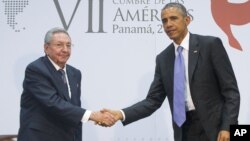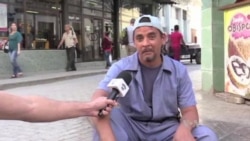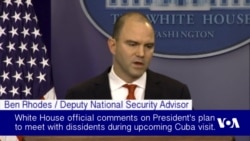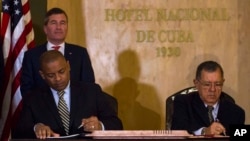It’s a visit the communist nation has waited on for nearly a century.
Just 14 months after ordering the restoration of diplomatic ties with Cuba, Barack Obama will become the first sitting American president to travel to Havana in nearly 90 years.
“We see it as a means of pushing forward this normalization process, trying to achieve a greater opening between the United States and Cuba commercially, but also supporting and advancing the values that we care about,” White House deputy national security adviser Ben Rhodes told reporters Thursday.
The president will highlight those universal values during his March 21-22 trip, Rhodes said, while meeting with Cuban dissidents, civil society members and the Cuban government.
In particular, the White House official said Obama would raise with Cuban officials the detention and harassment of those wanting to express their basic rights.
Watch video report from VOA's Katherine Gypson:
But why is the president making the historic visit now, amid continuing concerns about human rights?
“Not going and isolating Cuba doesn’t serve to advance those issues," Rhodes said. The United States "will be in a better position to support human rights and to support a better life for the Cuban people by engaging them and raising these issues directly.”
Obama, who will be joined by his wife, Michelle, will hold bilateral talks with Cuban President Raul Castro but has no plans to meet with his brother, Fidel Castro, the revolutionary leader who took power in Cuba more than half a century ago but has retired for health reasons.
The American president met his Cuban counterpart twice before, first on the sidelines of the Summit of the Americas last April and again at the U.N. General Assembly in September.
In a tweet Thursday, Obama noted his trip would seek to advance bilateral ties and "efforts that can improve the lives of the Cuban people."
Cuban officials welcomed the upcoming visit and expressed a willingness to discuss any issue.
Peter Kornbluh, an analyst and co-author of Back Channel to Cuba, said the timing of Obama’s historic trip would be key in solidifying U.S. engagement with Havana.
“Make it irreversible, so that even if a Marco Rubio, a Ted Cruz or a Jeb Bush is elected the next president of the United States, the investment by U.S. companies, U.S. society in better relations with Cuba is permanent,” Kornbluh said.
Since the historic thaw in ties was announced in December 2014, Obama has made steady progress in breaking down diplomatic barriers with the former Cold War enemy. The successes include restoring diplomatic relations and reopening embassies in each country's capital.
The U.S. also has removed Cuba from its list of state sponsors of terrorism.
Using his executive authority, Obama has persistently chipped away at the long-standing U.S. restrictions on business, investment and travel in Cuba. The latest step came last week when the two countries reached an arrangement to restore direct, regularly scheduled commercial flights between the countries, the first in more than 50 years.
But while Obama has loosened restrictions on Cuba, progress on the Cuban end has stalled, according to John Kavulich, president of the U.S.-Cuba Trade and Economic Council.
"The Cubans haven't really done anything, other than allowing more individuals into Cuba and making more money from them," Kavulich told VOA.
But Havana could be motivated to make some major concessions over the next year, Kavulich said, in part to forestall any future U.S. president who might want to reverse Obama's policies.
"Everything can be reversed," he said. "And if the only activities are some airlines traveling to Cuba, that's not going to be much of an impediment for a new president. So the Cubans now know they're going to have make some things happen."
Obama can also continue to loosen restrictions on his own. The biggest change would be to allow Cuba to use U.S. dollars in its international transactions, a move that could dramatically and rapidly stimulate the Cuban economy.
"That is the last of the big regulations that [Obama] has control of," Kavulich said. "He may be saving that for this trip."
Photo gallery: US Rapprochement With Cuba
But there are limits to what Obama can accomplish unilaterally. The U.S. economic embargo on Cuba, which has been in place for decades, can be removed only by Congress. Rhodes said Thursday that the administration was reaching out to lawmakers and that bipartisan support for greater engagement with Cuba was growing.
Other issues that complicate U.S.-Cuban relations include the American-run military base at Guantanamo Bay, Cuba. Raul Castro has said the only way for ties to be completely restored is if Washington returns the base to Cuban control.
Rhodes said that while Cuban officials would most likely raise the issue during talks, giving Guantanamo back to Havana was “not on the table.”
Obama is working to meet the promise he made upon taking office in 2009: closing down the controversial prison at Guantanamo, which holds dozens of suspected terrorists.
Watch: July 01, 2015 — President Obama Addresses US-Cuba Relations


















